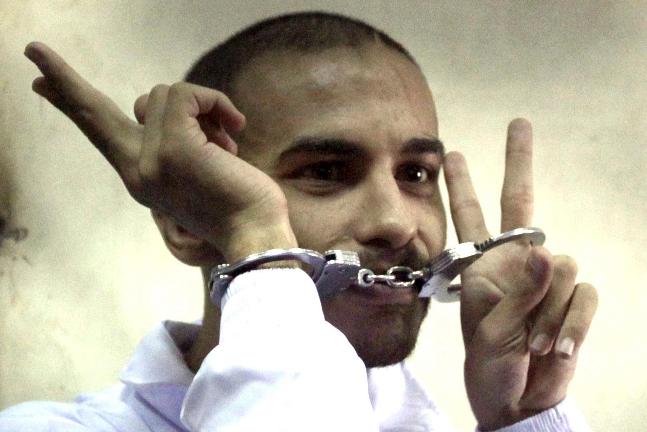
With an initial wave of protests against an anti-Islam film dying down rather quickly in Egypt, an increase in blasphemy cases throughout the country appears to be a byproduct of these events. While blasphemy laws were often manipulated under the Mubarak regime, the number of cases in Egypt increased sharply over the past few weeks, with the latest charges brought against two minors.
In Beni Suef, Nabil Nagy Rizk, 10, and Mina Nady Farag, 9, were arrested and are being held pending investigation, under accusations of insulting religion. Accused of ripping up papers, which included pages of the Qu’ran, the two boys are being held in a Beni Suef juvenile detention facility, with investigations resuming on Sunday.
The case comes on the heels of the arrest of Alber Saber, an activist and blogger who has been detained and could be facing up to 5 years in prison for sharing the anti-Islam film, The Innocence of Muslims on Facebook. Arrested on September 13, Saber faces charges of insulting Islam and Christianity and promoting atheism. It also follows a court ruling upholding the 6 year imprisonment of Coptic teacher, Bishoy al-Beheiry, convicted on charges of insulting Islam and the president.
Salafi preacher, Abu Islam Ahmed Abdullah is also facing charges of defaming Christianity, his case postponed until October 14, for burning copies of the bible during the protests in front of the US embassy on September 11. Charges are also being brought against journalist, Hani Gadallah, the editor of local daily, al-Tahrir for an interview with Abdullah in which he made defamatory statements about Christianity.
An additional case has been brought against graffiti artist Ayad Orabi, currently under investigation over charges of insulting Islam in one of his paintings. These are just a few of the latest cases that have emerged in the past few weeks.
This sudden surge in blasphemy cases comes at a time when religion continues to be one of the primary causes for concern regarding Egypt’s draft constitution, with critics alleging that the new clauses offer less freedoms than the 1971 constitution afforded. Article 8 brings similar fears expressed over women’s rights in the constitution, due to ambiguous statements which, when left open to interpretation, could easily be manipulated to serve a politicized purpose.
Article 8 states, “Freedom of belief is absolute, and religious rights are practiced if not in contradiction with public order.” The problem lies in the newly added phrase, absent from the 1971 constitution: “if not in contradiction with public order.” As Mohamed El-Agati, political researcher and director of the Arab Forum for Alternatives, tells Egypt Independent, the new clause also absolves the state of the responsibility of guaranteeing religious freedoms, a provision which was also included in the 1971 constitution. As these arguments continue, there have also been renewed calls for the addition of an anti-blasphemy clause in the constitution.
The constitution is not the only cause for concern as far as these blasphemy cases are concerned. The current penal code, Article 98(f) to be precise, stipulates up to 5 years imprisonment for the “disparaging or contempt of any divine religion or its adherents.” Under the Mubarak regime, it was this very article that was often manipulated to bring charges against its opposition.
Since the emergence of the anti-Islam film, 17 blasphemy-related cases have been brought before the prosecutor’s office. The Arab Network for Human Rights Information released a statement calling for a change to the penal code: “Blasphemy charges need to be reconsidered; they should be replaced with articles against hate speech that is accompanied with inciting violence. These articles should not be used to try people’s ideas.”
As arguments over the separation of religion and state rage on, blasphemy cases continue to emerge, in which lengthy sentences are being doled out over. A pervasive air of pressure surrounds many of these cases. Al-Beheiry’s sentencing came in the midst of protests outside the courthouse, with calls for his death. Al-Beheiry’s lawyer believes that his client’s case was subject to unfair conditions because of this intimidation. While a fear of vigilantism may have been the case in al-Beheiry’s sentencing, if anything, authorities have only further legitimized vigilante acts in Egypt with the arrest of Alber Saber, after a mob attacked his home.
ANHRI describes the current regime’s authoritative use of Article 98(f) as a means of silencing government opposition. While amending the penal code is a priority, it must be accompanied by a firm stance on the part of authorities, one which rejects the intimidation of its courts and which brings an end to the continued use of Mubarak-era tactics.
Nancy Messieh is the associate director of the Atlantic Council’s Rafik Hariri Center for the Middle East and editor of EgyptSource, a blog following Egypt’s transition.
Photo Credit: Reuters
Image: Alber%20Saber.jpg
